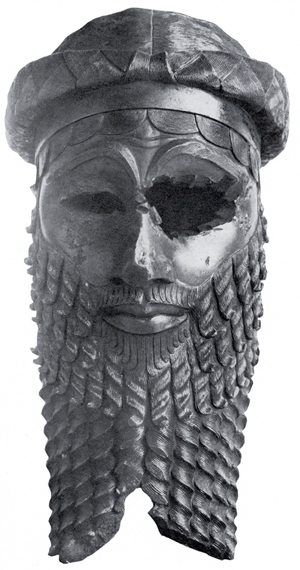Twelve thousand years ago, humans transitioned from hunter-gatherer societies to agriculture-based societies. Humans began to settle in ever larger communities, and gradually created civilizations. Neolithic villages began to flourish in Mesopotamia after 6000 B.C.E., due to its rich soil and water sources (Tigris and Euphrates rivers). The first of the civilizations that developed was the Sumerian. Many other civilizations would follow, including the Akkadian city-states, which would form to the north of the Sumerians.
According to Akkadian legend, a woman of Akkad became pregnant, carrying the illegitimate child of a temple priest. Unable to keep the child, she was forced to set her son adrift in a basket on the Euphrates River, where he was later found by a man named Akki, a gardener for Ur-Zababa, the King of the Sumerian city of Kish.1
This child would come to be Sargon of Akkad (Sargon the Great). He would grow to one day usurp the kingship of his own city of Agade, which would come to be the capital of his empire. After developing his Akkadian city of Agade and building a strong military, after 2350 B.C.E., he began to conquer. Many city-states located around Mesopotamia were involved in trading and attempting to aid one another, which often led to conflicts and war. Sargon used his army to bring these small conflicts to an end by conquering each Sumerian city-state one by one. He was viewed as a talented administrator and brilliant warrior. Sargon was wise in going on the offensive against the Sumerian city-states, conquering each, destroying all their defensive walls, as well as any enemy who stood before him. His empire is thought to have included most of Mesopotamia and parts of the Levant, besides incursions into Hurrite and Elamite territory, making him the founder of the Old Akkadian Dynasty as well as the first Mesopotamian Empire. The Old Akkadian Dynasty ruled for about a century after his death, until the Gutian conquest of Sumer. Historians believe that the Gutians were tribes of mountain people who, combined with the revolting people of the various conquered cities, were responsible for the downfall of the Akkadian Empire around 2150 B.C.E. .2
As the first emperor in history, Sargon of Akkad had much success. Despite having no prior example to follow, he was able to take over and maintain Mesopotamia for over fifty years. He financed his empire by seizing control of trade routes, taking all goods that crossed through his realm. This allowed his capital of Akkad (or Agade) to become the wealthiest and most powerful city in the world. He was able to maintain his empire by placing his best and most trusted men in positions of power in various cities. They would be appointed by Sargon himself to serve as governors and administrators in over 65 different cities. These leaders were referred to as the “Citizens of Akkad” in later Babylonian texts. Anytime Sargon took over a city, it rapidly became an Akkadian stronghold, full of Akkadian officials and troops.3 This stability throughout the empire allowed the construction of roads, a wider influence of trade, improved irrigation, as well as developments in arts and in science. Sargon standardized weights and measures for trade and daily commerce. He also managed to initiate a system of taxation and created the first postal system.

These various improvements to the lives of the people of Mesopotamia were not enough to prevent the various conquered peoples from gathering to rebel against Sargon and his administration. Being forced to stay under the rule of an emperor who defeated various groups, taking their land and goods, fueled the people to rebel. By 2150 B.C.E., the Akkadian Empire had collapsed in the midst of rebellion from within and from outside invaders attempting to take the fertile land of Mesopotamia. The story of Sargon loosing his empire to inside rebellion is only one of many. When a group of conquered people are forced to live under another’s rule, it is common for them to look for ways to strike back, overthrow those kings who often attempt to rule them well. Later rulers would improve Sargon’s administrative techniques by relying on centralized bureaucratic rule and regular taxation.4
Sargon created the very first political entity on a large scale and set the standards for all future rulers of empires. Through his unique upbringing, never meeting or knowing his parents, he was able to rise to power. Initially he was nothing but the king’s cupbearer (a butler); none expected that he would one day come to conquer and maintain the land wanted by all. Sargon of Akkad would become the topic of legendary narratives in later Assyrian and Babylonian literature, focusing on his rise to power from humble origins and his conquest of Mesopotamia. These memories of his successful deeds would later inspire conquerors to follow his example and would provide all the future people of Mesopotamia with a powerful hero to idolize.
- Ancient History Encyclopedia, September 2009, s.v. “Sargon of Akkad,” by Joshua J. Mark. ↵
- Ancient History Encyclopedia, September 2009, s.v. “Sargon of Akkad,” by Joshua J. Mark. ↵
- W. F. Albright, “A Babylonian Geographical Treatise on Sargon of Akkad’s Empire,” Journal of the American Oriental Society, Vol. 45 (1905): 193-201. ↵
- The Macmillan Encyclopedia, 2003, s.v. “Sargon of Akkad,” by Alan Isaacs. ↵



51 comments
remedios naturales
Very nice post. I just stumbled upon your blog and wished to say that I have truly loved surfing around your weblog posts. In any case I’ll be subscribing on your rss feed and I am hoping you write again soon!
Aaiyanna Johnson
It is truly staggering to me of how far humans have come. From being hunter-gatherers, to creating villages to sustain their populations, and safety. I noticed that the Akkadian legend is very similar to the story of Moses. They both are sent down a river, out of care from their mothers, and is found by royalty. I enjoyed this article.
Lisa Varela
This news article is very informative! The facts provided in the article had me very impressed. I had heard the name Sargon of Akkad in my history courses but I did not know so many informative facts. The accomplishments that he came to do were very impressive, especially since he was the first emperor in history. And to think that the emperors that would follow would be inspired by his accomplishments and use it as a map to their own ruling.
Samman Tyata
Great! Your article was really informative. I got the chance to know more about The World’s First Emperor through your article. It’s really interesting to know that Sargon created the very first political entity on a large-scale and set the standards for all future rulers of empires. Additionally, It is awesome that he managed to initiate a system of taxation and created the first postal system. I really liked the way how you have structured your essay. Overall it was a well written and very good article.
Tyler Sleeter
Great article, lots of good information. I first heard of Sargon when doing research on the biblical story of Moses, but I did not really know all the things Sargon had done in his life. I think it is interesting that Sargon was able to accomplish so much after starting life floating in a basket down a river. I also found it interesting that the people he had conquered worked on the inside to bring down the empire. I never heard of the Akkadian Empire until reading this, but it was very informative.
Liam Gillooly
The mythical story of an orphan turned king becoming a great leader is such a great plot. No wonder just about every culture can lay claim to such a hero. Sargon is a truly amazing figure, seeing as he had no real examples to look at. The fact that someone could amass such an empire while basically playing it by ear is incredible.
Matthew Rios
An excellent read, I believe you captured the Sargon of Akkad’s story very well! While its not mentioned obviously, I think it’s cool to think about how his successors like Hammurabi of Babylon improved upon his “administrative techniques”, and instead of focusing on suppressing the people he employed bureaucratic rule. To think, this era predates philosophical minds that focused on many of the foundations of societal structure that were implemented in Mesopotamia!
Osman Rodriguez
I really enjoyed going through this article. As you pointed out at the end, it is astonishing seeing such a figure rise to power when he started from nothing. I believe the basis of this story is valuable, as it teaches people that no mater your circumstances and what people think about you, you can still succeed and amount to great things. Unfortunately, like all great empires, they eventually will come to an end.
Sergio Cervantes
Great article written over the life of the first man who helped establish the first empire compiled of many city-states and peoples! I think he was smart in declaring war only on one city-state at a time instead of setting himself up against multiple enemies. Without a doubt, these multiple city-states would have formed an alliance and declared war on this figure and his city-state. It is interesting to see that this man was able to effectively administrate his entire empire without a blueprint, enacting new laws and policies that would help ensure his dominion over all whom he conquered.
Sergio Cervantes
Prior to reading this article, I did not know the very first emperor ruled in Mesopotamia. It is surprising to read about all his conquests and successful wars that enabled him to create a powerful empire. He was smart in seizing the city-states that included important trade routes, the very ones that would help finance his treasury and keep a powerful army. The origins of his early childhood remind me in some way of Moses and the biblical story; it being the fact that they both were taken out of a body of water and raised eventually to lead a nation to glory.